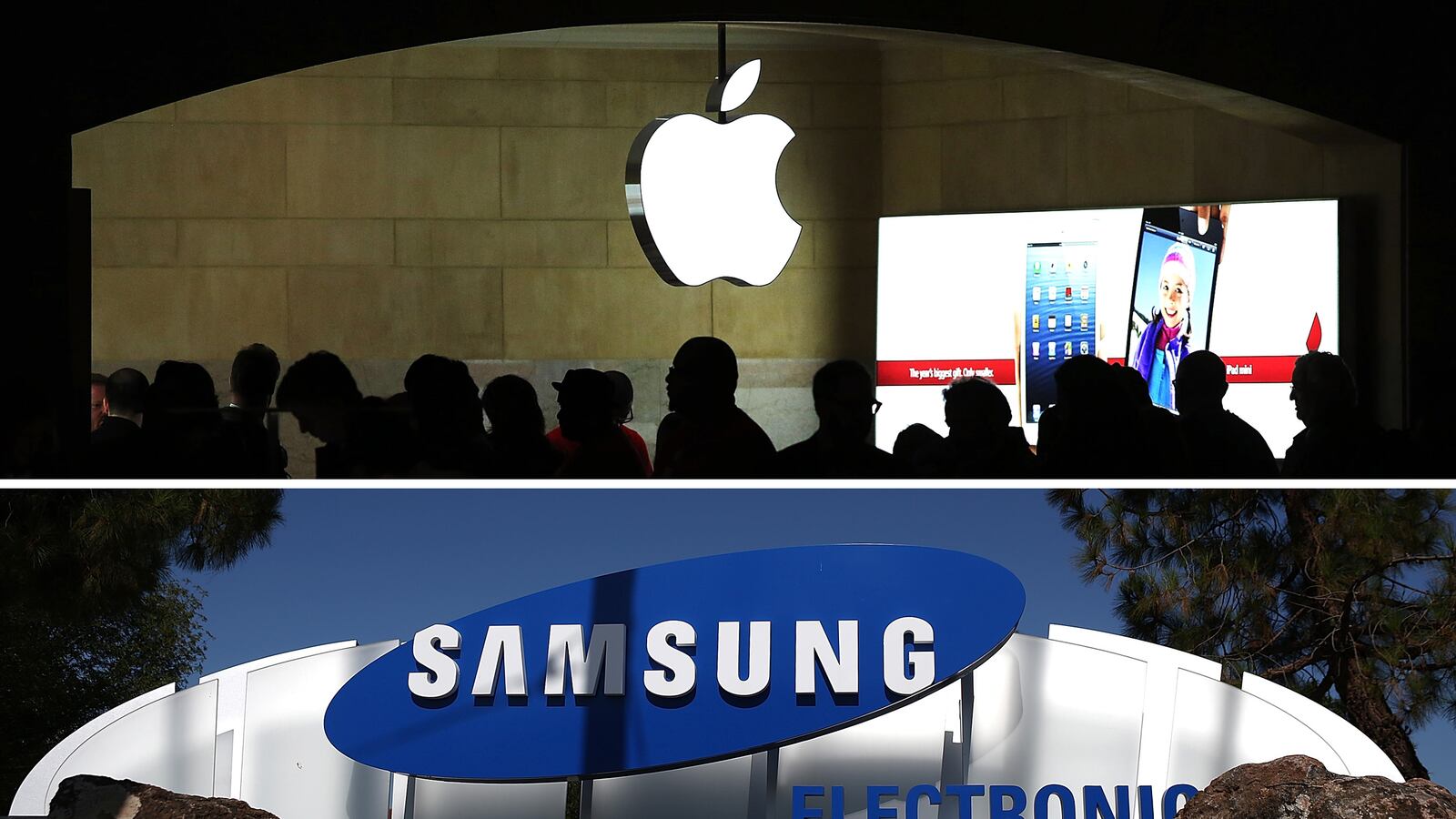Apple and Samsung just don’t love each other anymore. The two tech giants have been fighting for years, embroiled in over 50 lawsuits worldwide on charges and countercharges of patent infringement. So now they’re finally going to separate. Apple is reportedly dropping Samsung as its chip manufacturer.

It’s going to be tough on the kids: namely, your iPhone or iPad, which are Apple on the outside, but powered by a heart of Samsung silicon. Currently every iOS device runs on a Samsung microprocessor: Apple orders about 200 million of them a year.
But not for long. Asymco, a mobile-industry analyst, predicts that in 2013 Apple will start cutting its Samsung orders. By 2014 the divorce will be final. Every Samsung microprocessor will go into a Samsung product. Apple will get its chips elsewhere. It’s a market-shaking breakup—one that will affect Apple and Samsung, and the entire industry.
How did two of the world’s biggest companies get here? In typical divorces, the lawyers get involved only after things have fallen apart. But in this instance, the lawyers came first. In the U.S., a jury in August concluded that Samsung had infringed on Apple patents relating to smartphones, awarding about $1 billion in damages. Samsung is appealing the verdict, which it calls “a loss for the American consumer.” As it happens, Apple’s patent library is massive: it’s pretty hard to design a smartphone without infringing one of them. But some of Samsung’s recent product releases certainly look to have been influenced by a little Apple inspiration. The debate rages on, in and out of the courts.
In August, Apple doubled down, launching another massive lawsuit targeting 17 Samsung phones and tablets. In November, Samsung fired back, hiking Apple’s chip prices 20 percent. Currently, 23% of the microprocessers Samsung makes are sold directly to Apple.
Apple has already started cutting orders for the chips, and is now dating Taiwanese manufacturers: Unimicron Technology Corp and Semiconductor Manufacturing Company (TMSC), one of the world’s leading chip manufacturers. But the split is messy. In the short run, Samsung loses a multibillion-dollar contract for the world’s most reliably selling mobile products. But Samsung also sees some benefit from starting to manufacture exclusively for its own devices. According to research from Digitimes, Samsung’s processor orders are slated to grow more than 36 percent next year, as the Android devices they power grow more popular. And by 2014, when every single Samsung processor heads straight into a Samsung device, its capacity for own-brand devices will be up 270 percent compared to 2012. Samsung can happily sell to itself.
What about Apple? Without its Korean frenemy, the company will have to switch to a new megasupplier. But few single manufacturers can hit Samsung’s volume—not even Intel, which already has a major contract for MacBook chips. That means Apple may have to turn to more than one company: chipmakers with different models, designs, standards, and prices. There’ll be unavoidable transaction costs. And the much-prized unanimity—the reliable identicalness—of Apple’s iWorld could be at risk. The real result here is that Samsung and Apple are both turning inward into their own barricaded castles, and starting to produce their own parts once more: a costly reintegration of design and manufacturing. Apple has always wanted to make everything you use. Now Cupertino is going to have to make a lot more of what it uses too.
So why do it? Why doesn’t Apple just stick it out, for the sake of the kids? Put simply, the decision has a lot to do with Apple’s antipathy toward its competitors—and the control it wants to exercise over its products. Apple’s “walled-garden” approach creates a beautiful, simple, but functionally closed tech ecosystem. The strategy can backfire. First, there was the Apple Maps debacle, precipitated by a competitive desire to kick the much-loved Google Maps platform off iOS—an unmitigated disaster, for which the company has apologized. Apple wants you checking your calendar through iCal (not Google), saving articles to “read later” with Safari (not Instapaper), and storing your cloud files in its Airplay system (not Dropbox’s). The company wants your iTunes downloads copy protected, easily accessible only through Apple products. Hence, the near-Stalinist vetting of what Apps it allows in its Store—hence a needless shift to new, proprietary iPhone and iPod plugs and laptop network connectors.
For the most part, the “All Apple, All The Time” strategy has been successful. But with computing becoming more personalized, and with hardware and software becoming more open source, a single company can’t design the perfect “everything” for “everyone.” Apple’s enterprise products still can’t hold a candle to Microsoft’s good old-fashioned Office suite. When was the last time sent you a Pages file instead of a dot-doc? Apple wants you to enjoy yourself in a closed, pristine ecosystem, only evolving with the occasional Apple-mandated software update or new gadget release. Indeed, it’s beginning to look a lot like 1984—the famous Apple ad, that is. But this time, it’s the “Think Different” company’s hegemonic head on the big screen, preaching “you must obey” to legions of tinkerers.
Last month, Bloomberg reported that Apple is considering another major supply-side shake-up. The company may replace the Intel chips that have powered its laptops since 2005 with Apple-designed chips, based on ARM Holdings technology, and manufactured by—you guessed it—the Taiwan Semiconductor Manufacturing Company. Apple wants to control more and more of the value chain in order to keep their products more and more closed.
Google and Samsung, Apple’s major mobile competitors, have a far different strategy. The Android mobile platform is far more open, customizable, and flexible—providing access to suites of apps and legions of developers that Apple wouldn’t even let past the coat check. Google is embracing the rise in DIY tech, in phones you can tinker with, in software enablers that run on all platforms—even competitors’. Google recently released an Android Open Accessory standard, based on the open-source computing platform Arduino. It will allow developers to build their own peripherals for Android phones.
Apple is setting a huge challenge for itself by turning away from Samsung; the new leadership thinks the rocky breakup is worth it. But the decision isn’t just a product of Team Tim Cook. It’s an echo of Steve Jobs—the Jobs who cursed out his competitors, who promised to “go thermonuclear war” on the “stolen product” Android, who would always cut a feature rather than add one. Jobs’s search for a beautiful, plug-and-play intuitiveness, unmuddied by a wide range of design and developer options, planted the walled garden. And the walls are getting higher.






